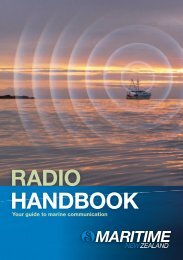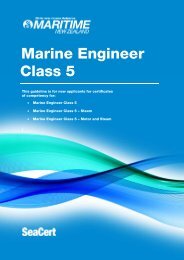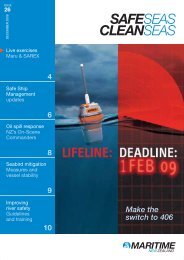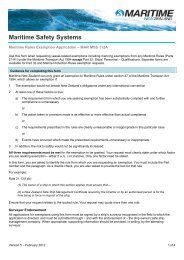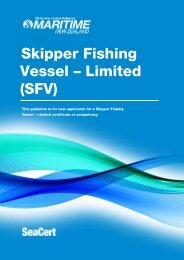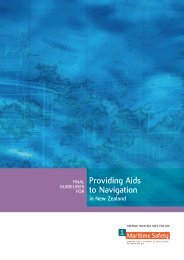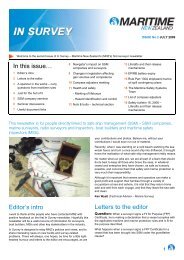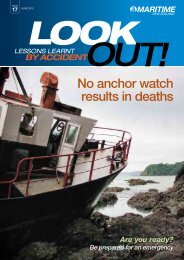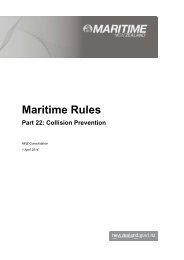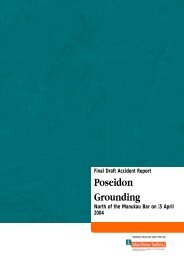New Zealand oil spill response strategy - Maritime New Zealand
New Zealand oil spill response strategy - Maritime New Zealand
New Zealand oil spill response strategy - Maritime New Zealand
You also want an ePaper? Increase the reach of your titles
YUMPU automatically turns print PDFs into web optimized ePapers that Google loves.
THE NEW ZEALAND MARINE OIL SPILL RESPONSE<br />
STRATEGY<br />
Introduction<br />
The <strong>New</strong> <strong>Zealand</strong> Marine Oil Spill Response Strategy outlines the means by which the nation will<br />
respond to a marine <strong>oil</strong> <strong>spill</strong> of any size. However few, if any, nations are able to mount credible<br />
<strong>response</strong>s to major <strong>spill</strong>s alone. Based on the results of comprehensive risk assessments, <strong>New</strong><br />
<strong>Zealand</strong> maintains an appropriate domestic capability to respond to a ‘one-in-one-hundred’ year<br />
event. For larger <strong>spill</strong>s it has established arrangements for international assistance with other nations<br />
through the provisions of the 1990 International Convention on Oil Preparedness, Response and Cooperation<br />
(OPRC). <strong>New</strong> <strong>Zealand</strong>’s own commitment to assist its international partners in times of need<br />
is also fundamental to the ongoing success of this reciprocal agreement.<br />
Partnerships also form the foundation of <strong>New</strong> <strong>Zealand</strong>’s domestic capability. Neither effective<br />
contingency planning nor successful <strong>response</strong>s would be possible without the co-operation of<br />
regional authorities or industry, plus a wide range of organisations and individuals with specialist skills.<br />
Aim<br />
The Strategy describes the framework within which an efficient and effective <strong>response</strong> is provided to<br />
any marine <strong>oil</strong> <strong>spill</strong> in <strong>New</strong> <strong>Zealand</strong> waters.<br />
Key Principles<br />
The three most important and fundamental principles underlying the Strategy are that:<br />
• The <strong>response</strong> capability will be maintained and developed through successful relationships and<br />
partnerships between <strong>Maritime</strong> <strong>New</strong> <strong>Zealand</strong>, regional councils and unitary authorities,<br />
government partners, industry and domestic and overseas agencies.<br />
• Protection of human safety, health and welfare is of paramount importance in preparing for and<br />
responding to marine <strong>oil</strong> <strong>spill</strong>s. This includes the health and safety of the public, industry<br />
personnel and the <strong>spill</strong> responders;<br />
• Net Environmental Benefit Assessment (NEBA) will underpin the decision making process<br />
concerning <strong>response</strong> options and clean-up standards.<br />
The other basic principles are that:<br />
• The polluter pays principle is fundamental, so the full, reasonable cost of any <strong>spill</strong> <strong>response</strong>,<br />
clean-up and reasonable restoration efforts should be sought from the <strong>spill</strong>er;<br />
• On-scene commanders should ensure that initial mobilisation is sufficient to implement an<br />
effective and credible <strong>response</strong>;<br />
• The best available specialist advice should be sought before decisions are made;<br />
• Industry has a responsibility to undertake its business without creating unnecessary risks, and is<br />
responsible for the risks it does create;<br />
• Those industries and other maritime activities which create the risk of a marine <strong>oil</strong> <strong>spill</strong> should<br />
contribute to the costs of maintaining and implementing the Strategy via an <strong>oil</strong> pollution levy;<br />
• Oil <strong>spill</strong> planning and <strong>response</strong> systems must be comprehensive, integrated and effective;<br />
• All people and agencies associated with planning and <strong>response</strong> should be aware of and<br />
committed to their agreed responsibilities;<br />
• Risk assessment is an integral part of <strong>response</strong> planning, preparation and levy allocation;<br />
• The National Marine Oil Spill Contingency Plan must provide the means for the National On-<br />
Scene Commander to be able to mount a credible <strong>response</strong> to any marine <strong>spill</strong> regardless of<br />
size;<br />
• Resources, training and equipment will be allocated on the basis of risk analysis to reflect<br />
national and regional needs, to ensure prompt reaction with appropriate resources in the event<br />
of a <strong>spill</strong>;<br />
• A progressive, tiered approach is required for all preparation and planning for, and <strong>response</strong> to,<br />
marine <strong>oil</strong> <strong>spill</strong>s;<br />
• There will be national consistency across the range of <strong>oil</strong> <strong>spill</strong> planning and <strong>response</strong> activities;<br />
• Salvage of a vessel and/or its cargo is recognised as an important primary means of avoiding<br />
or mitigating the effects of a marine <strong>oil</strong> <strong>spill</strong>;<br />
4





